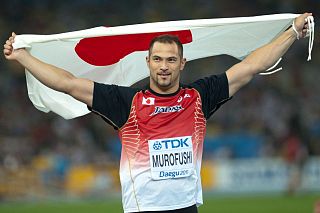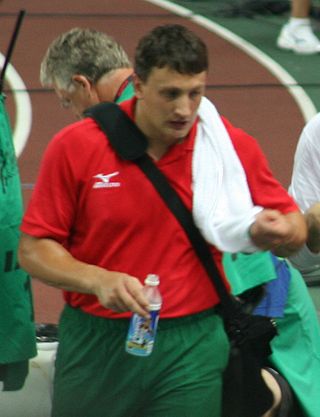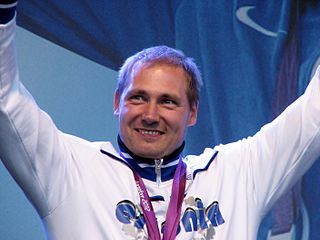
The men's hammer throw competition at the 2004 Summer Olympics in Athens was held at the Olympic Stadium on 20–22 August. There were 35 competitors from 24 nations. After a series of doping-related disqualifications, the event was won by Koji Murofushi of Japan, the nation's first medal in the event. All distances are given in metres.

Belarus competed at the 2004 Summer Olympics in Athens, Greece, from 13 to 29 August 2004. This was the nation's fifth appearance at the Summer Olympics in the post-Soviet era. The Belarus Olympic Committee sent a total of 151 athletes to the Games, 82 men and 69 women, to compete in 22 sports.

Athletes from Belarus began their Olympic participation at the 1952 Summer Games in Helsinki, Finland, as part of the Soviet Union. After the Soviet Union disbanded in 1991, Belarus, along with four of the other fourteen former Soviet republics, competed in the 1992 Winter Olympics as the Unified Team. Later in 1992, Belarus joined eleven republics to compete as the Unified Team at the Summer Games in Barcelona, Spain. Two years later, Belarus competed for the first time as an independent nation in the 1994 Winter Olympics, held in Lillehammer, Norway.

Ivan Ryhoravich Tsikhan is a Belarusian hammer thrower. He is a two-time world champion and an Olympic medalist.

Koji Alexander Murofushi, is a former Japanese hammer thrower and sports scientist. He has been among the world elite since the 2001 World Championships, where he won the silver medal. He was the 2004 Olympic champion. In 2011, he was crowned world champion.

Vadim Anatolyevich Devyatovsky is a Belarusian hammer thrower.

Krisztián Pars is a Hungarian hammer thrower. He competed at the Summer Olympics in 2004, 2008, and 2012, winning the gold medal in 2012. He also won the 2012 and 2014 European championships.

Libor Charfreitag is a former hammer thrower from Slovakia. His personal best throw is 81.81 metres, achieved in June 2003 in Prague.

Dilshod Jamoliddinovich Nazarov is a Tajik track and field athlete who specializes in the hammer throw. He has represented his country at the Olympic Games on four occasions, winning the gold medal in Rio de Janeiro, the first gold medal for Tajikistan in the history of the Olympic Games.

Belarus attended the 2008 Summer Olympics in Beijing, China. A team of 181 athletes competed in 28 different sports.

The men's discus throw event at the 2008 Summer Olympics took place on 16–19 August at the Beijing National Stadium. Thirty-seven athletes from 29 nations competed. The event was won by Gerd Kanter of Estonia, the nation's first victory in the men's discus throw. Piotr Małachowski took silver to give Poland its first medal in the event. Lithuanian thrower Virgilijus Alekna's bronze made him the third man to win three medals in the sport, adding to his gold medals from 2000 and 2004.
The Men's Hammer Throw event at the 2009 World Championships in Athletics was held at the Olympic Stadium on August 15 and August 17. With reigning champion Ivan Tsikhan banned from competition for doping offences, the 2008 Olympic gold and silver medallists Primož Kozmus and Krisztián Pars were the favourites in the event. Pars entered the competition with a world-leading throw of 81.43 m and an 18 competition win-streak. Belarusian Yuriy Shayunov and Russian Aleksey Zagornyi, the only other athletes to have thrown over eighty metres twice that season prior to the championships, were identified as possible podium finishers. Nicola Vizzoni, Igor Sokolov, Olli-Pekka Karjalainen, Szymon Ziółkowski, Koji Murofushi, and Libor Charfreitag were all predicted to have an outside chance of a medal.

Hungary competed at the 2012 Summer Olympics in London, from 27 July to 12 August 2012. Hungarian athletes have competed at every Summer Olympic Games in the modern era, except the 1920 Summer Olympics in Antwerp, and the 1984 Summer Olympics in Los Angeles because of the Soviet boycott. The Hungarian Olympic Committee sent the nation's smallest delegation to the Games since 1956 to London. A total of 159 athletes, 97 men and 62 women, competed in 18 sports.

Slovenia competed at the 2012 Summer Olympics in London, United Kingdom. This was the nation's sixth consecutive appearance at the Summer Olympics. The Slovenian Olympic Committee sent the nation's third-largest delegation ever to the Games. A total of 65 athletes, 28 men and 37 women, competed in 15 sports. For the first time in its Olympic history, Slovenia was represented by more female than male athletes. Slalom kayaker and multiple-time world champion Peter Kauzer was the nation's flagbearer at the opening ceremony. The London Games also featured Slovenia's Olympic debut in triathlon.

The men's hammer throw competition at the 2012 Summer Olympics in London, United Kingdom was held at the Olympic Stadium on 3–5 August. There were 41 competitors from 32 nations. The event was won by Krisztián Pars of Hungary, the nation's first victory in the men's hammer throw since 1996 and fifth overall. Primož Kozmus of Slovenia, the 2008 winner, took silver. Koji Murofushi of Japan, the 2004 winner, took bronze. Kozmus and Murofoshi were the 12th and 13th men to earn multiple medals in the hammer throw.

The Men's Hammer throw event at the 2011 World Championships in Athletics was held at the Daegu Stadium on August 27 & 29.
The 2007 European Cup Winter Throwing was held on 17 and 18 March at Avangard Stadium in Yalta, Ukraine. It was the seventh edition of the athletics competition for throwing events organised by the European Athletics Association. A total of 203 athletes from 26 countries entered the competition – a new high for the event.
The men's discus throw competition at the 2016 Summer Olympics in Rio de Janeiro, Brazil, was held at the Estádio Olímpico João Havelange on 12–13 August. Thirty-five athletes from 24 nations competed. Germany's Christoph Harting succeeded his brother Robert Harting to the Olympic title. "It was the first time in Olympic history, in any sport, that brothers succeeded each other as Olympic champions in the same individual event." It was also the nation's third victory in the event. Poland's Piotr Małachowski took the silver medal ahead of another German, Daniel Jasinski. Małachowski had also won silver eight years before, making him the 16th man to win multiple medals in the discus throw.

The men's hammer throw was a competition at the 2016 Summer Olympics in Rio de Janeiro, Brazil. The event was held at the Estádio Olímpico João Havelange between 17–19 August. There were 32 competitors from 24 nations. The event was won by Dilshod Nazarov of Tajikistan, the nation's first medal in the men's hammer throw and first gold medal in any Olympic event. Ivan Tsikhan of Belarus took silver, the 14th man to win multiple medals in the event in adding to his 2008 bronze. Bronze went to Wojciech Nowicki of Poland, the nation's first medal in the event since 2000.












